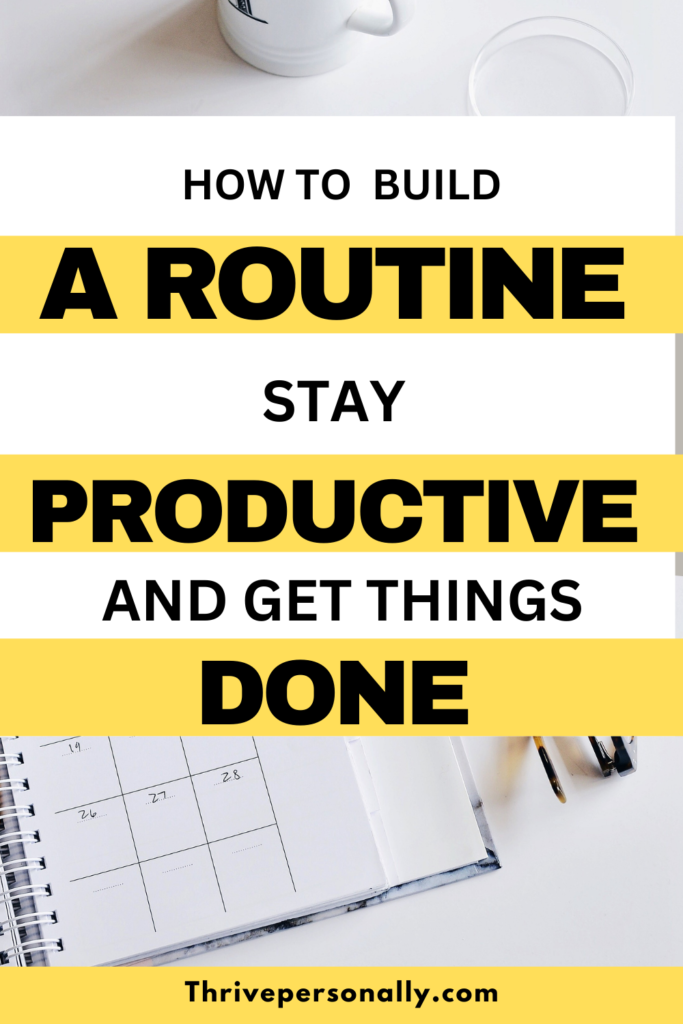Establishing a routine is a crucial aspect of organizing your day and enhancing your productivity. Routines serve as a framework that guide you through your daily tasks, allowing you to allocate time efficiently and prioritize what truly matters.
By having a set of predictable actions, you create a sense of order in your life, helping to eliminate chaos and confusion. This structure minimizes the time spent deciding what to do next, enabling you to focus more on execution rather than planning.
Identifying Your Goals
Identifying specific goals is a crucial step in building an effective routine that enhances your productivity. To start, consider what you genuinely want to accomplish in your daily or weekly life. You should think about both short-term and long-term objectives, as each serves a distinct purpose in shaping your routine.
Short-term goals are those you aim to achieve in the near future, typically within days or weeks. They can include tasks such as completing a project at work, exercising three times a week, or reading a certain number of pages a day. These goals are manageable and provide immediate gratification, making them excellent motivators to keep you focused and productive.
On the other hand, long-term goals are broader and often require more time to achieve. These may span several months or even years and might include aspirations such as advancing your career, mastering a new skill, or saving for a significant investment.
Having clearly defined goals provides a framework for your routine. When you understand what you wish to achieve, it becomes easier to allocate your time and resources effectively. Take some time to thoughtfully consider what you want;
regular reflection on your goals can help you stay adaptable and make adjustments to your plan as necessary. By establishing and prioritizing your goals, you empower yourself to make meaningful progress both personally and professionally. This strategic alignment between your tasks and objectives can significantly boost your productivity.
Read Also: 20 Achievable Goals to Help You Grow and Improve
Creating a Daily Schedule
To enhance your productivity, developing a daily schedule that aligns with your personal preferences and energy levels is vital. Begin by identifying the time when you typically feel most alert and focused. This is the optimal time for you to tackle your most challenging tasks. For example, if you find that you are most productive in the morning, structure your schedule to start your day around that time, allowing ample hours for deep work.
Consider breaking your day into manageable blocks of time, which many productivity experts refer to as time blocking. Allocate specific periods for tasks, ensuring each block is dedicated to a singular focus.
A common approach is to adhere to the Pomodoro Technique, which suggests working for 25 minutes followed by a 5-minute break. This method keeps you engaged and helps mitigate fatigue. You can easily adjust the block durations according to what suits you best; for instance, you might prefer working for 50 minutes with a 10-minute break. The key is to find a rhythm that maintains your momentum throughout the day.
Incorporating regular breaks is essential. During these intervals, give yourself permission to engage in activities that refresh you, be it stepping outside for fresh air, practicing mindfulness, or simply enjoying a cup of tea. This practice not only recharges your brain but also bolsters your overall productivity.
Additionally, don’t forget to carve out time for leisure and relaxation. Including these moments in your schedule ensures that you maintain a balanced approach to productivity, preventing burnout. Devoting time to hobbies or social interactions can ultimately enhance your creative output.
Read Also: How to Build a Daily Routine That Feels Perfect for You (8 Tips)
Staying Organized

Staying organized is a pivotal component in enhancing your productivity. When you establish an organized environment or system, you equip yourself with the tools needed to stay focused and efficient. One effective method is to utilize planners or productivity apps.
These tools can help you map out your tasks, set deadlines, and prioritize your activities. By breaking down larger projects into smaller, manageable tasks, you can maintain a clear vision of your goals and track your progress. This clarity not only bolsters your motivation but also minimizes feelings of overwhelm.
In addition to using planners, consider the physical organization of your workspace. A tidy environment is conducive to a clear mind. Clutter can distract you from your tasks, making it difficult to focus and reducing your overall efficiency.
By taking time each day to declutter your desk and organize your materials, you are fostering a workspace that promotes productivity. This may include sorting paperwork, organizing digital files, or ensuring that essential tools are easily accessible. A well-organized workspace can serve as a reflection of an organized mind.
Setting your materials in the right place is essential. You can create designated areas for different tasks, which allows you to quickly access necessary supplies without disruption. Furthermore, implementing a routine check-in at the end of each day can help you assess what has been accomplished and what remains for tomorrow.
This routine not only assists in maintaining organization but also helps you stay on track with your overarching goals. By integrating these strategies into your daily life, you will find that staying organized naturally supports the building of a routine, ultimately leading to greater productivity.
Read Also: 32 Inspiring Challenge Ideas to Transform Your Life
Time Management Techniques
Effective time management is crucial for enhancing productivity, allowing you to accomplish more in less time. Various techniques can assist you in streamlining your workflow and addressing tasks more efficiently.
Technique to consider is time blocking. In this method, you allocate specific time periods for different tasks or activities throughout your day. By assigning a rigid timeframe for each task, you minimize distractions and remain committed to completing your work within the designated period. This structured approach ensures that you remain proactive in tackling your responsibilities, instead of reactive and often overwhelmed by them.
Prioritization is yet another essential time management technique. Utilizing tools such as the Eisenhower Matrix can help you distinguish between tasks that are urgent and important versus those that can be delegated or postponed. By focusing your energy on high-priority tasks, you can significantly enhance your productivity levels, ensuring that you dedicate time to what truly matters.
Incorporating these time management techniques into your daily routine allows you to gain better control over your tasks and time. Whether you choose the Pomodoro Technique, time blocking, or prioritization methods, what is essential is the commitment to implementing them consistently. By doing so, you will likely find yourself feeling less overwhelmed and more accomplished in your daily activities.
Read Also: 10 Practical Ways to Stop Wasting Time and Be More Productive
Avoiding Distractions
Maintaining focus amidst a barrage of distractions is essential for staying productive. You may find that distractions come in various forms, from digital interruptions to physical disturbances in your workspace. To cultivate an environment conducive to productivity, it is vital that you first identify what distracts you most frequently.
Common distractions can include social media notifications, emails, or even background noise. By being aware of these interruptions, you can take proactive steps to minimize their impact on your routine.
One effective strategy to limit distractions is to establish specific times for checking your electronic devices. Setting aside dedicated slots for emails and social media can help you avoid the temptation to engage in these activities during focused work periods. Furthermore, you can utilize apps designed to block distracting websites during work sessions, ensuring that you remain concentrated on the task at hand.
Creating a quiet workspace plays a critical role in enhancing your productivity. You may want to assess your work environment and consider relocating to a more serene location if necessary. If complete silence is not achievable, consider investing in noise-canceling headphones or playing soft background music; both can effectively drown out distracting noises. Remember to inform your colleagues or family members about your work hours, encouraging them to respect your focus time.
Moreover, focusing on one task at a time significantly improves your ability to concentrate. Multitasking may seem efficient, but it often leads to diminished productivity as your attention gets fragmented. By honing your focus on a singular task, you allow yourself to engage more deeply with the work, resulting in better quality output.
Building Healthy Habits

Establishing healthy habits is essential to creating a productive routine that allows you to effectively get more done each day. Achieving a balance in areas such as sleep, nutrition, and physical activity can significantly enhance your focus and overall efficiency.
One of the foundational elements in building healthy habits is ensuring that you get adequate sleep. Adults typically require between seven to nine hours per night for optimal functioning. Creating a consistent sleep schedule helps regulate your body clock, making it easier for you to wake up refreshed and ready to tackle daily tasks.
Equally important is your diet. Eating well nourishes your body and mind, providing the energy you need to remain productive throughout the day. Incorporating a variety of fruits, vegetables, whole grains, and lean proteins into your meals can directly impact your physical and mental well-being.
It can be beneficial to plan your meals ahead of time to avoid impulsive eating choices, which often lead to unhealthy habits. You might also consider scheduling regular meal times to maintain your energy levels and keep your focus sharp.
Furthermore, engaging in regular exercise not only improves physical health but also enhances your mental clarity and mood, making you more productive. Aim for at least 150 minutes of moderate aerobic activity each week, which could include brisk walking, cycling, or swimming. Integrating short exercise breaks into your workday can rejuvenate your mind and body, allowing you to return to tasks with renewed vigor and attention.
Reflecting on Your Progress
Reflecting on your progress is an essential component of building a successful routine. As you strive to stay productive and accomplish your goals, regularly evaluating your achievements allows you to identify what is working well and what requires adjustment. Taking the time to assess your progress not only fosters a sense of accountability but also encourages personal growth, providing a clearer perspective on your productivity efforts.
To integrate reflection into your routine, consider setting aside time each week dedicated to this important task. During this reflection time, think about the tasks and goals you set for yourself. Which ones did you accomplish? Where did you encounter challenges? This structured evaluation offers you an opportunity to analyze your performance in a systematic way, which can yield valuable insights.
During these sessions, it is beneficial to keep a journal or digital document where you can note your achievements, challenges, and any changes you wish to implement moving forward. This practice not only creates a record of your progress but also helps you visualize the areas where additional focus may be needed.
Recognizing patterns in your productivity can assist you in determining whether certain tasks are best scheduled at specific times of the day or whether particular strategies should be employed for certain projects.
Overcoming Setbacks
Every individual embarking on the journey of building a routine encounters setbacks along the way. These obstacles are an inherent part of the process, and it is crucial for you to understand that it is completely normal for things not to go as planned. Instead of viewing these challenges as failures, consider them as opportunities for growth and learning. Acknowledging that setbacks can occur allows you to approach the situation with a more positive mindset, which is essential for maintaining your motivation.
When you face a disruption in your routine, it is vital to assess the situation and identify the triggers that led to this setback. Ask yourself what factors contributed to the misalignment with your planned schedule. This reflection helps you gain valuable insights into your habits and the dynamics of your routine, enabling you to make necessary adjustments. Adapting your approach based on this self-assessment is key to resilience. Think of your routine as a living entity that requires care and modification over time.
Moreover, developing a toolbox of strategies to bounce back when setbacks occur can enhance your overall productivity. Setting realistic expectations is one effective method. By understanding that perfection is unattainable, you can reduce the pressure you place on yourself.
Encourage yourself to embrace flexibility within your routine. If you miss a workout or fail to complete a task, it does not mean you should abandon your entire schedule; instead, find ways to easily reintroduce them later in the week.
Save the pin for later



